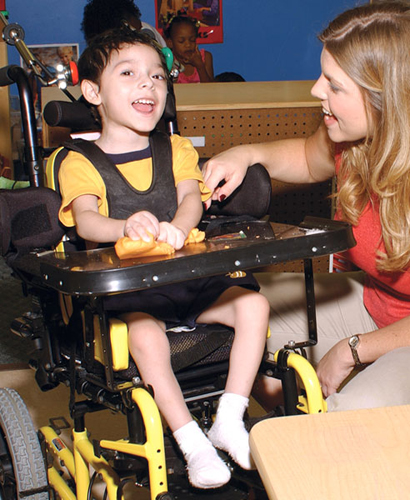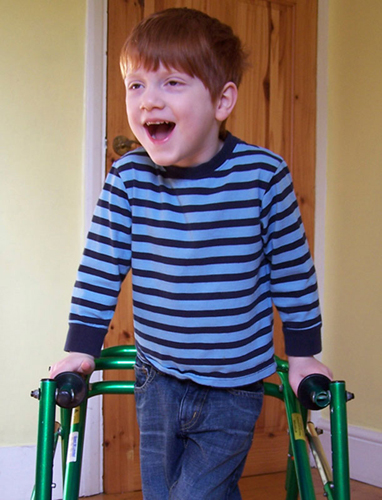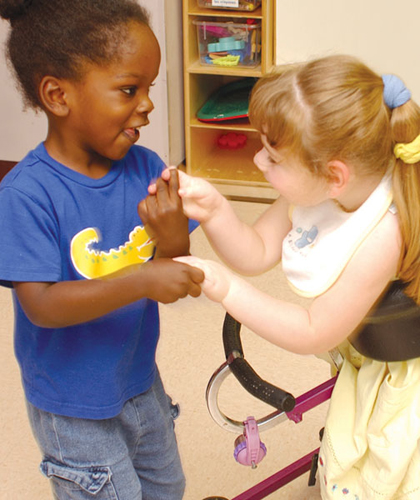Physical challenges Coping with disability
If your child has a
physical disability such as cerebral palsy (a condition that affects
movement, posture, and coordination), or a hearing or visual impairment,
starting school will bring additional challenges. Many more children
now attend mainstream as opposed to special schools, which is a positive
step forward in many ways. However, this means that some schools may
lack experience of supporting children with additional physical needs.
Open, honest, and regular communication with the school will help them
make the adjustments necessary to ensure that your child is fully
integrated into school life, and not just included on the attendance
roll.
Team approach
The key to a smooth,
successful transition to school is to have all the involved
professionals—health, education, and social care—working together with
you on a coordinated plan to support your child’s needs. Ideally this
team of people should begin meeting with you some time in advance of
your child’s move so that the appropriate support will be in place when
he starts, before specific needs arise. If your child has experienced a
successful day-care or other preschool placement, talk to the staff from
that setting as they may have valuable information to share. Make sure
that they are invited to attend these meetings.
Raising awareness
Staff and students
will have different experiences of children with special needs. This
will affect their expectations of your child and how they behave toward
him initially. Your child’s classmates will probably be curious and ask
questions about your child’s difficulties, while some teachers may be
anxious about how best to interact. It will take time for everyone to
get to know each other, and this could be a steep learning curve. People
will want to do their best to support and include your child. However, a
simple lack of understanding may result in well-intentioned but
unnecessary or inappropriate attempts to help. At other times, your
child may struggle because not enough help is provided. Be clear in
communicating your child’s needs, and encourage him to speak up when he
needs additional help. Write down a list of your child’s strengths and
weaknesses to share with the school. To be more comprehensive, you may
also wish to provide the faculty with a fuller description of your child
and his story so far.
School environment
Consideration may need to be
given to the content and layout of your child’s classroom, as well as
other parts of the school he will need to access, such as the playground
and science labs. Bear in mind the following questions when you are
meeting with faculty:
Can my child get into school safely and easily, or will adaptations such as ramps and lifts be necessary?
Is the classroom easy to access and move around in? Where will my child sit to ensure he can take part in all activities?
How will my child be assisted in moving around school for recess, assemblies, and lunchtime?
Are the signs around school clear, visible, and easy for my child to understand?
Can my child access the play area independently?
In
the unlikely event of a fire, how will my child be supported to exit
the building quickly and safely? Fire doors fitted with magnetic safety
catches (so they close only in the event of a fire) can make life much
easier for children with mobility problems.
Curriculum
Discuss with school
faculty what support your child needs in the classroom to enable him to
join in with his classmates and follow the curriculum. Remember that
this is likely to change as the demands of the curriculum change, so
make time to schedule regular meetings with his teachers to stay up to
date. If your child finds the coursework too difficult, a more
individualized education plan may be suggested.
The following issues will need to be explored
Will a special teacher or counselor be available to provide additional support to my child and his teachers?
Can my child access all the materials he needs to use in the classroom?
What additional teaching resources can be used to help my child?
Will staff be given special training or any specialist equipment my child may need to use?
Will
my child need any one-on-one support? If so, will this be rotated to
avoid his becoming too dependent on one particular person?
Social life
The quality of your
child’s social life at school will have a significant impact on his
confidence, self-esteem, and happiness. Careful consideration needs to
be given to the opportunities he will have for social interaction with
his classmates. Morning arrival, recess, and lunchtime are all social
hotspots, and your child should be as fully included in these activities
as possible. Some schools employ a buddy system, where one of a number
of pupils will take a turn spending time with and helping your child.
School trips and after-school activities are also important for building
bonds. Find out what trips and activities are planned for the term, and
speak to your child’s teacher about ways in which he can be included.
Children with
obvious physical needs can often be overprotected by others, which may
limit their opportunities to spend time with their peers. Getting the
balance right between safety and independence can be tricky at times.
You know your child better than anyone else, so talk to him about what
he would like to be involved in and try to make it happen.
Special helper
Some schools provide a dedicated member of staff to look after your child, helping him adjust to his new environment.

Being prepared
Discuss with the school any piece of special equipment your child needs, and make sure they know how it works.

Playing around
Whether your child enjoys school or not will to a great extent depend on her interaction with other children.
